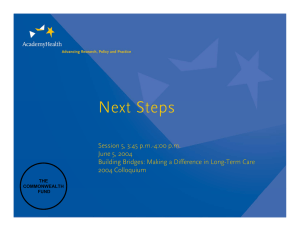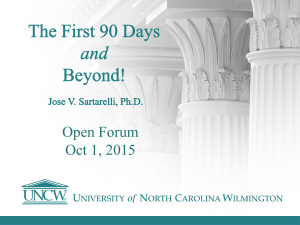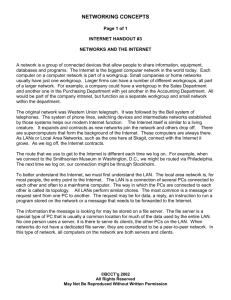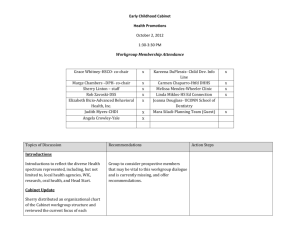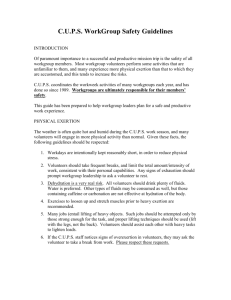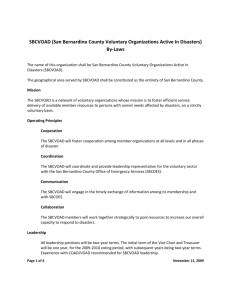Document 11983011
advertisement
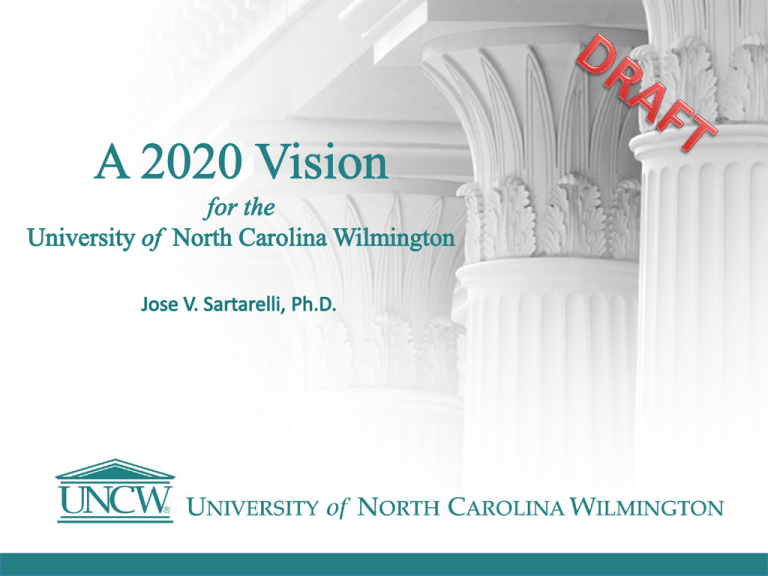
OPPORTUNITIES • Quality students • Strong programs: Creative Writing, Marine Biology, Nursing, Chemistry, Accounting, Psychology Online, international, transfer, joint programs • • Number of high school graduates in the state and the southeast still growing; international down and up Strong experiential learning/promising engagement • • Selective and competitive sports programs CHALLENGES • • • • Continued challenges with state funding Increased competition for talent, both domestic and global Interdisciplinary and joint programs Need for continued and stronger support for scholarships, chairs, programs and research Balance between selectivity and growth • • 18% out-of-state limit VISION BETTER ENGAGED GLOBAL MISSION The University of North Carolina Wilmington, the state’s coastal university, is dedicated to the integration of teaching and mentoring with research and service. Our commitment to student engagement, creative inquiry, critical thinking, thoughtful expression, and responsible citizenship is expressed in our baccalaureate and masters’ programs, as well as doctoral programs in areas of expertise that serve state needs. Our culture reflects our values of diversity and globalization, ethics and integrity, and excellence and innovation. VALUES Diversity/Globalization Ethics/Integrity Excellence/Innovation STRATEGIC PRIORITIES Attract the best diverse global talent Educate well and advance research Enable students to succeed Engage the world Fund the vision Building a great university in North Carolina UNCW 20,000 students 100 active scholarships 100 Fortune 500 companies to campus to recruit Increase level of engagement in Cape Fear Region 1150-1300 SAT Range 90% retention 75% graduation Continuous accreditation $20M in sponsored research League-competitive in key sports Fund Engage Enable Success Educate/Advance Research Attract 2020 5-10 chairs/ professorships New programs operationalized 1500 Trifecta * Study abroad * Int’l students * Online $10M-$20M in gifts/yr (10% of alumni giving) 70th Anniversary STRATEGIC PRIORITIES ATTRACT THE BEST DIVERSE GLOBAL TALENT • 20,000 by 2020 vs. 15,000 today • 1150-1300 by 2020 vs. 1110-1250 today • Strengthen high-quality recruiting in NC, out-of-state, transfer, online • • • • • • • and international Top 10 among regional universities in the South vs. 16th today Expand, deepen international footprint by focusing on G-20 countries with specialized/dedicated organization Expand and deepen online recruiting solely and or with partners Balance selectivity and growth through significant increase in scholarships Ensure fundraising to attract great students (100+ scholarships) and great faculty (5-10 chairs) Ensure diverse slates for all open positions Make sure faculty and staff are competitive in the marketplace STRATEGIC PRIORITIES EDUCATE STUDENTS WELL AND ADVANCE RESEARCH • Launch new programs that capitalize on UNCW’s strengths, state of • • • • • • • • the discipline and needs of the state Identify areas of excellence and of interest to the state and invest create waves of excellence Ensure fundraising to support new programs Pursue joint programs that turbo-charge student opportunities Develop global program with key partners in G-20 countries Expand and deepen online offerings across campus (BS’s and MS’s) Incentivize scholarship and applied research through greater research support, journal lists for publications, recognition of grant-seeking skills, honor/recognition and focus on sponsored research ($20 million/yr) Attract top teachers/researchers from top universities to campus Retain re-accreditation focus STRATEGIC PRIORITIES ENABLE STUDENTS TO SUCCEED • Aim for 90% retention at first year and 75% at graduation in six years • Ensure recruiting, advising and placement work hand-in-hand to ensure student success • Bring 100+ Fortune 500 companies to campus to recruit/top government organizations/NGOs, etc. • Ensure students develop personal brand plan from day one to compete in the marketplace or to pursue graduate education • Ensure experiential learning including international placement/internships • Ensure Assurance of Learning is in place throughout STRATEGIC PRIORITIES ENGAGE THE WORLD • Run an inventory of all areas/centers of expertise of the university and how they bring value to the community • Draw on existing projects to take engagement to different level • Re-think the organization to provide leadership in engagement with full support from Academic Affairs • Ensure engagement is focused first in the city, the region, the state and the world (in that order) • Target, cultivate potential partners – businesses, government agencies, NGOs/multilateral organizations, foundations, universities, community colleges/high schools STRATEGIC PRIORITIES FUND THE VISION • Raise amount of alumni giving to 10% by 2020 vs. 6% today, ($10M to $20M per year) • Use the “Great School” approach to fundraising: Great Students + Great Faculty + Great Programs + Great Facilities + Great Name(s) = Great School • • • • Prepare for new campaign 2017 – 70th Anniversary Provide the state reasons for continuing support of UNCW and its needs Ensure Auxiliary Services are positive contributors to support students Run effective/efficient educational organization centered on students, zero-based budgeting and strong procurement • Unify strategic, operating budget and master plans through greater engagement of deans, greater transparency and greater accountability Moving Forward Together 1. Create Expanded Leadership Council for Strategic Planning 2. Establish Workgroups to Develop Seven Plan Components: STRENGTHS/WEAKNESSES/OPPORTUNITIES/TRHEATS (SWOT) VISION/MISSION/VALUES ATTRACT THE BEST DIVERSE GLOBAL TALENT EDUCATE STUDENTS WELL AND ADVANCE RESEARCH ENABLE STUDENTS TO SUCCEED ENGAGE THE WORLD FUND THE VISION 3. Establish the timeline Moving Forward Together Balance in each workgroup between faculty and original Leadership Council Balance in each workgroup between “subject matter experts” who see the trees and “generalists” who see the forest Provide necessary resource materials, data, and other support to workgroups Important resources include: Draft/conceptual presentations shared since July 14 Office of Institutional Research & Assessment data: http://www.uncw.edu/oira/ Documents from previous UNCW strategic plans: http://www.uncw.edu/planning/docs.html The university planning web page will be updated and used for this process and will include the Chancellor’s draft presentations Members of Cabinet (Chancellor, Provost, Vice Chancellors, and others) are available as “free” consultants If any of the workgroups feel that it would be beneficial to have the services of a facilitator, those arrangements can be made (contact Mark Lanier) Moving Forward Together: Workgroups SWOT Analysis: Chris Finelli, Chair Steffaney Cohen Nathan Crowe Rigo Rincones-Gomez Andy Mauk Pam Seaton Candace Thompson Ron Vetter Sarah Watstein Michael White Cabinet: Eddie Stuart Moving Forward Together: Workgroups Vision/Mission/Values: Mark Galizio, Chair Cathy Barlow Dawn Brown Van Dempsey Art Frampton Vibeke Olson Adrienne Swinney Brian Victor Brad Walker Cabinet: Pat Leonard Moving Forward Together: Workgroups Attract/Recruit: Charlie Hardy, Chair Stuart Borrett Cara Cilano Terry Curran Tracy Hargrove Venita Jenkins Mark Morgan Sara Thorndike Paul Townend Cabinet: Kent Guion Moving Forward Together: Workgroups Educate/Research: Martin Posey, Chair Antje Almeida Dan Baden Jess Boersma Dan McCord Steve Meinhold Ann Pabst Bev Vagnerini Mike Walker Cabinet: John Scherer Moving Forward Together: Workgroups Enable/Place: Tammy Hunt, Chair Jeffrey Bruinsma Lindsay LeRoy Rosalynn Martin Laurie Patterson Jeanne Persuit John Rack Thom Rakes Jimmy Reeves Cabinet: Janine Iamunno Moving Forward Together: Workgroups Engage: Lori Messinger, Chair Kristen Brogdon Natasha Davis David Donaldson Steve Elliott Carol Heinrich Lynn Leonard Susan Simmons Reggie York Cabinet: Jimmy Bass Moving Forward Together: Workgroups Fund the Vision: Christy Ward, Chair Sharon Boyd Rob Burrus Carrie Clements Susan Faircloth Jennifer Horan Stefanie Powell Bob Roer Aswani Volety Cabinet: Rick Whitfield Moving Forward Together: Timeline Before Today July 14: Staff Council, presentation/discussion of concepts/draft July 14: Deans, presentation/discussion of concepts/draft July 15: Leadership Council, presentation/discussion of concepts/draft July 17: Board of Trustees, presentation/discussion of concepts/draft August 11: Faculty Senate Steering Committee, presentation/discussion of concepts/draft August 12: Leadership Council, with additional faculty members included, discussion of proposed process September 9: Expanded Leadership Council for Strategic Planning September 10: Expanded Leadership Council for Strategic Planning Moving Forward Together: September Timeline September 10 through 29: meetings of workgroups, arranged by chairs September 23, 4pm: Meeting of workgroup chairs September 29, 2:30 pm: Expanded Leadership Council for Strategic Planning Moving Forward Together: October Timeline October 1, 8:30 am: Campus Fall Forum October 2 through 13: Workgroup meetings October 14, 9am: Leadership Council, with workgroup chairs October 16: Board of Trustees update October 21, 3:30 pm: 2nd open forum October 19 through November 10: Workgroup meetings Moving Forward Together: November Timeline November 4, 8am: Workgroup chairs’ meeting (if needed) November 11, 3:30 pm: Expanded Council November 12 through December 2: Workgroup meetings November 18: Workgroup chairs’ meeting (if needed) Moving Forward Together: December Timeline December 2 and/or December 16: Expanded Council completes and celebrates its work! Moving Forward Together What should the work product or output of each workgroup be? SWOT analysis (succinct summary of strengths, weaknesses, opportunities, and threats, building on what already exists) Vision/values/mission (succinct versions of each, building on what already exists) Moving Forward Together What should the work product of each workgroup be? For each of the five workgroups working on a strategic priority, use of templates similar to the following slides would result in a consistent format, terminology, and voice across the various workgroups EXAMPLE GOALS METRICS OWNER TIMING FUNDING EXAMPLE ATTRACT/RECRUIT GOALS METRICS OWNER TIMING FUNDING 20,000 STUDENTS BY 2020 VS. 15,000 TODAY • Dedicated recruiters/rankings • Increased number of scholarships • New/joint programs • Different modes of delivery (online) • New geographies Actual registered students at the beginning of semesters • Academic Affairs • Advancement • Business Affairs Fall/Spring/ Summer • State • Self THANK YOU!
